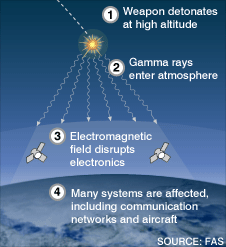A few articles about Etherium have been showing up on my feed lately. Basically, Etherium is a digital currency like Bitcoin but it has a broader range of uses aside from allowing anonymous currency trading. One of the most interesting features of this new system is the ability to create decentralised applications.
After looking at what is possible with Decentralized Autonomous Organizations (DAO) and considering that we already have advanced AI in use in many areas, I can see huge potential in this new technology but just as obviously, there is the possibility of a decentralised application causing problems.
The central feature of decentralised applications is for me, also the most worrying. Once the application is created and started, it does not exist on any particular real world structure, it exists in 'the internet', or more accurately, it exists in a widely distributed network that is constantly changing. If you've ever used torrenting software to download a movie, you might have a clearer grasp of this concept. The application exists in the connection between participating computers and servers.
This is a wonderful feature because it means the applications are immune to the failure of hardware at any particular site or the interruption to any particular connection. Nothing short of turning off every computer involved in the network would stop the application.
And there is also what makes me cautious.
The application has access to a form of currency. It is possible for the application to use that currency to hire premises and equipment and create more of that currency. The application could even form a company, buy land, apply for planning permits, hire trades people and build premises and then pay staff to run it.
If the application started to do things that we didn't want to continue, it has no off switch, it doesn't exist on a particular server. In the same way that the internet has no off switch. We saw during the Arab spring, a government try to shut down the internet in their country and citizens were able to work around that. I think it's got to the point of accepting that the internet cannot be shut down except with extremely severe methods. Almost unthinkable methods that would have a devastating effect on human life.
Autonomous software and decentralised applications are an exciting new possibility. The scenario I have described sounds far fetched but Steve Jobs announced the first iPhone on January 9, 2007. It has only been 10 years since the first pocket sized computer was announced and now we have wireless internet, streaming video, driving directions from the cloud linked to GPS positioning. An internet connected fridge or toaster sounded like flying cars 10 years ago. They are available in retail stores now, oh and the flying car is coming too.
My point is that I don't think this is something that our grand children will have to deal with, I think we will be dealing with it within the next 5 years. That's right - half the time it took to get from the announcement of the first iPhone to the layer of mobile computing and wireless connectivity that exists today. Let's start talking about it now. Do you think my prediction is too far fetched?
Have a look at what decentralised apps exist now
Top 10 Disruptive Ethereum Decentralized Apps (DApps) and Projects
7 Cool Decentralized Apps Being Built on Ethereum
Top 5 Ethereum DApps Available Right now
Vladimir Putin and Elon Musk have both made comments about the importance of AI to the world
Putin says the nation that leads in AI ‘will be the ruler of the world’
Competition for AI superiority at national level most likely cause of WW3 imo - Elon Musk
In the few hours after this blog post was posted, there have been 3 times as many views from Russia and Poland as the rest of the world.






No comments:
Post a Comment